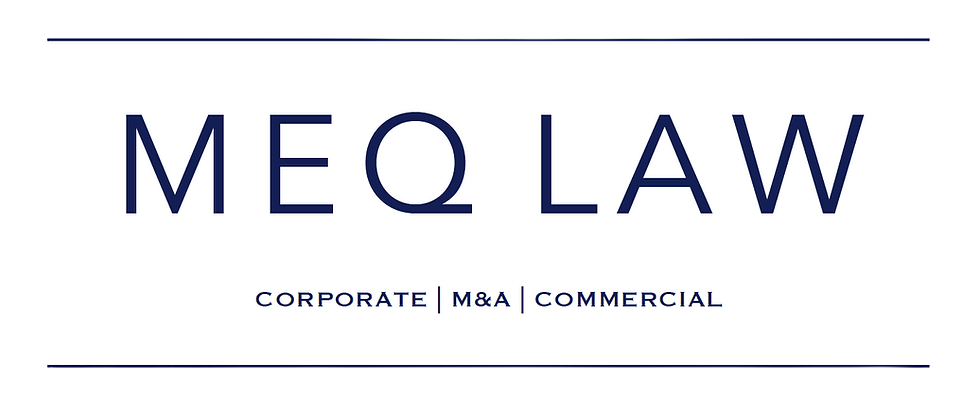Tax-Driven Corporate Reorganizations: Legal Steps and Pitfalls
In the evolving business environment of Ontario, corporate reorganizations are no longer rare events, but strategic necessities for many growing companies. While the potential for tax savings is a major draw, tax-driven corporate reorganizations can be fraught with legal complexity and costly pitfalls if not carefully planned and executed. For business owners, executives, and entrepreneurs considering restructuring, understanding the correct legal process and avoiding common errors is critical for long-term corporate and shareholder success. At MEQ Law, we specialize in guiding Ontario businesses through every legal aspect of corporate reorganizations, helping you achieve tax efficiency while protecting your interests.
Understanding Tax-Driven Corporate Reorganizations in Ontario
A tax-driven corporate reorganization is any restructuring of a corporation—such as mergers, asset transfers, share exchanges, or spin-offs—undertaken primarily for the purpose of achieving tax savings or improving tax positions. These reorganizations can help reduce ongoing tax liabilities, ensure compliance with the Canada Revenue Agency (CRA), and prepare a business for succession, sale, or investment.
Key reasons Ontario companies pursue tax-driven reorganizations include:
- Achieving a more tax-efficient corporate structure
- Preparing for intergenerational business transfers
- Facilitating investment or sale of the business
- Streamlining operations and consolidating entities
- Accessing tax-deferral mechanisms recognized under Canadian tax law
Legal Steps in Tax-Driven Corporate Reorganizations
While tax benefits are tempting, the path to a successful reorganization is paved with precise legal steps. As a law firm specializing in corporate law, MEQ Law assists clients from strategic planning through to filing and post-closing compliance. The critical legal steps include:
1. Comprehensive Tax and Legal Planning
Consult with both legal and tax advisors to assess your business goals, current structure, and future needs. MEQ Law helps coordinate with accountants to design a tax-efficient reorganization strategy tailored for Ontario businesses.
2. Structural Analysis and Entity Selection
Evaluate potential reorganization strategies such as asset transfers, amalgamations, or share exchanges. Identify which provisions of the Income Tax Act (Canada), such as Section 85 (rollover), Section 86 (share exchange), or Section 87 (amalgamation), apply.
3. Drafting Agreements and Corporate Resolutions
Meticulous preparation of legal documents is essential. This may include:
- Asset purchase, transfer, or amalgamation agreements
- Shareholder and partnership agreements
- Board and shareholder resolutions
- Section 85 rollover documents
- Amendments to articles of incorporation
4. Registering Changes and Notifying Authorities
File changes with relevant provincial and federal corporate registries (such as Ontario’s Ministry of Public and Business Service Delivery), and notify the CRA. MEQ Law oversees all statutory filings to ensure legal compliance.
5. Implementing the Reorganization
Execute agreements, transfer assets or shares, issue new securities, and confirm revisions to corporate records and the minute book. Proper execution and documentation help prevent future disputes and CRA challenges.
6. Post-Reorganization Compliance and Audits
Keep precise records of all transactions and legal documents. Schedule compliance reviews and prepare for potential CRA audits. Ongoing support from your legal counsel is crucial at this stage.
Pitfalls to Avoid in Tax-Driven Corporate Reorganizations
Despite the strategic upside, failing to observe certain legal requirements can turn anticipated tax savings into unexpected tax liabilities and penalties. Some common pitfalls include:
- Inadequate legal and tax planning prior to the reorganization
- Misuse or misapplication of rollover provisions (such as Section 85 improper documentation)
- Failure to obtain necessary board or shareholder approvals
- Omitting required filings or reports to government authorities
- Neglecting changes to the corporation’s minute book or share registers
- Overlooking the implications of non-resident shareholders or directors
- Poorly drafted or ambiguous reorganization agreements
Tips for Success – Engaging the Right Legal Partner
Working with a corporate lawyer who understands both the local regulatory landscape and the nuances of tax law is your best safeguard. At MEQ Law, our Ontario-based firm offers:
- Customized legal strategy aligned with your specific business objectives
- Seamless coordination with tax professionals during planning and execution
- Preparation and review of all necessary legal documents and agreements
- Proactive compliance management before, during, and after reorganization
- Ongoing support in the event of post-reorganization audits or disputes
Why Local Expertise Matters
Ontario’s corporate and tax laws have unique features and regulations. Changes to business legislation and government policy can directly impact the structure and outcome of your reorganization. MEQ Law’s deep knowledge of Ontario law means you receive tailored advice and up-to-date legal solutions, supporting both immediate tax efficiency and long-term stability.
Ready to Take the Next Step?
A tax-driven corporate reorganization offers significant opportunities—but only if the legal process is handled with care. Don’t let complex regulations or overlooked details undermine your goals. If you are considering a corporate reorganization in Toronto, Mississauga, Brampton, or anywhere across Ontario, reach out to MEQ Law for a consultation. Our experienced team will guide you from start to finish, ensuring your reorganization is executed strategically, efficiently, and in full compliance with Ontario law. Empower your business’s future—contact MEQ Law today.











